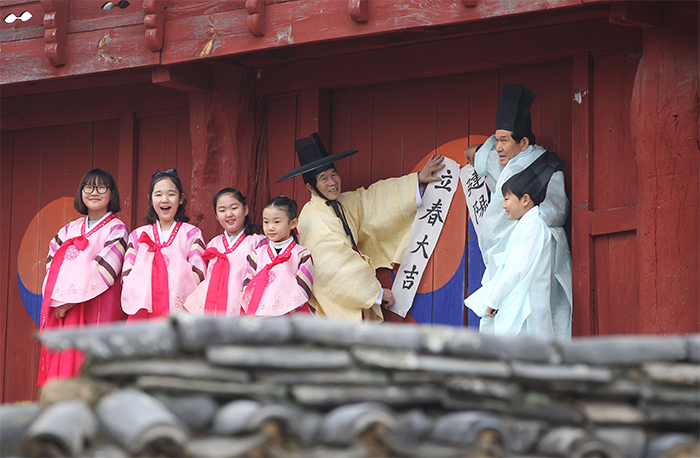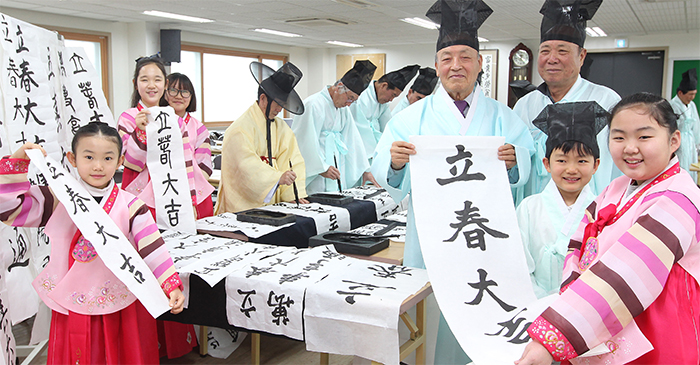Spring has sprung. The lunar calendar's traditional beginning of spring falls on Thursday, Feb. 4, this year. This day, or Ipchun (입춘, 立春, "beginning of spring"), marks many traditional farming ceremonies and rites, and also marks the beginning of the first of 24 solar terms that make up the lunar calendar.


On this day, people traditionally post on their household main gates large calligraphic notes welcoming the spring. The royal court would collect some of the best of these four-character poems, scripted by civil servants, and post them around the palace with pictures of lotus flowers and other signs of spring. These "lotus poems" were called "spring slips," or chuncheob-ja (춘첩자, 春帖子). A common phrase for the four-character poems would be, ""Ip-chun-dae-gil," or, "May the coming of spring be blessed with great happiness" (입춘대길, 立春大吉).
Farming villages across the country would harness a clay or straw bull to a plow and perform rituals praying for a good harvest. Concerning the weather, prognostications made on Ipchun were said to predict the weather for the coming year. Clear skies and little wind was considered good luck for the farming community.

Concerning food, the royal court would serve oshin-ban (오신반, 五辛盤, "platter of five pungent-tasting spring greens"), a vegetable dish of freshly-picked vegetables from both the royal garden and nearby mountainsides. Commoners would dine on sesaeng-chae (세생채, 細生菜, "spring green dish"), an assortment of mountain vegetables with a red sauce.
Help us welcome in the lunar calendar's official beginning of spring. Happy Ipchun!
More information can be found in English here:
http://folkency.nfm.go.kr/eng/subjectindex.jsp?d=seasonal&tit_idx=551&f=F2
More information can be found in Korean here:
http://folkency.nfm.go.kr/sesi/dic_index.jsp?P_MENU=04&DIC_ID=551&ref=T2&S_idx=317&P_INDEX=7&cur_page=1
By Gregory C. Eaves,
Korea.net Staff Writer
Photos: Kim Yong-man, Hamyang-gun County, Wi Tack-whan
gceaves@korea.kr

Celebrants enjoy the arrival of Ipchun, the formal beginning of spring by the lunar calendar.

Ipchun is the first of 24 seasonal divisions that make up the lunar calendar. On this day, people post large calligraphic notes on their household main gates, pillars or walls to wish for a prosperous new year. As the official first day of spring by the lunar calendar, people post messages that say 'Ip-chun-dae-gil,' or, 'May the coming of spring be blessed with great happiness' (입춘대길, 立春大吉), or which say 'Gun-yang-da-gyeong,' or, 'On a clear day, many good and joyful things will occur.'
On this day, people traditionally post on their household main gates large calligraphic notes welcoming the spring. The royal court would collect some of the best of these four-character poems, scripted by civil servants, and post them around the palace with pictures of lotus flowers and other signs of spring. These "lotus poems" were called "spring slips," or chuncheob-ja (춘첩자, 春帖子). A common phrase for the four-character poems would be, ""Ip-chun-dae-gil," or, "May the coming of spring be blessed with great happiness" (입춘대길, 立春大吉).
Farming villages across the country would harness a clay or straw bull to a plow and perform rituals praying for a good harvest. Concerning the weather, prognostications made on Ipchun were said to predict the weather for the coming year. Clear skies and little wind was considered good luck for the farming community.

Spanning the generations, people celebrate the traditional first day of spring, Ipchun, which falls on Feb. 4 this year.
Concerning food, the royal court would serve oshin-ban (오신반, 五辛盤, "platter of five pungent-tasting spring greens"), a vegetable dish of freshly-picked vegetables from both the royal garden and nearby mountainsides. Commoners would dine on sesaeng-chae (세생채, 細生菜, "spring green dish"), an assortment of mountain vegetables with a red sauce.
Help us welcome in the lunar calendar's official beginning of spring. Happy Ipchun!
More information can be found in English here:
http://folkency.nfm.go.kr/eng/subjectindex.jsp?d=seasonal&tit_idx=551&f=F2
More information can be found in Korean here:
http://folkency.nfm.go.kr/sesi/dic_index.jsp?P_MENU=04&DIC_ID=551&ref=T2&S_idx=317&P_INDEX=7&cur_page=1
By Gregory C. Eaves,
Korea.net Staff Writer
Photos: Kim Yong-man, Hamyang-gun County, Wi Tack-whan
gceaves@korea.kr